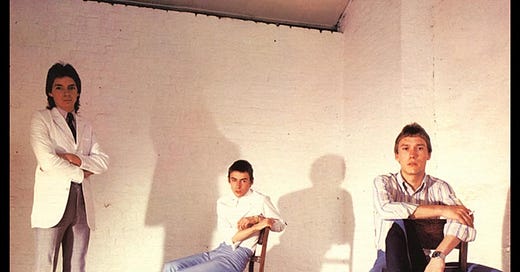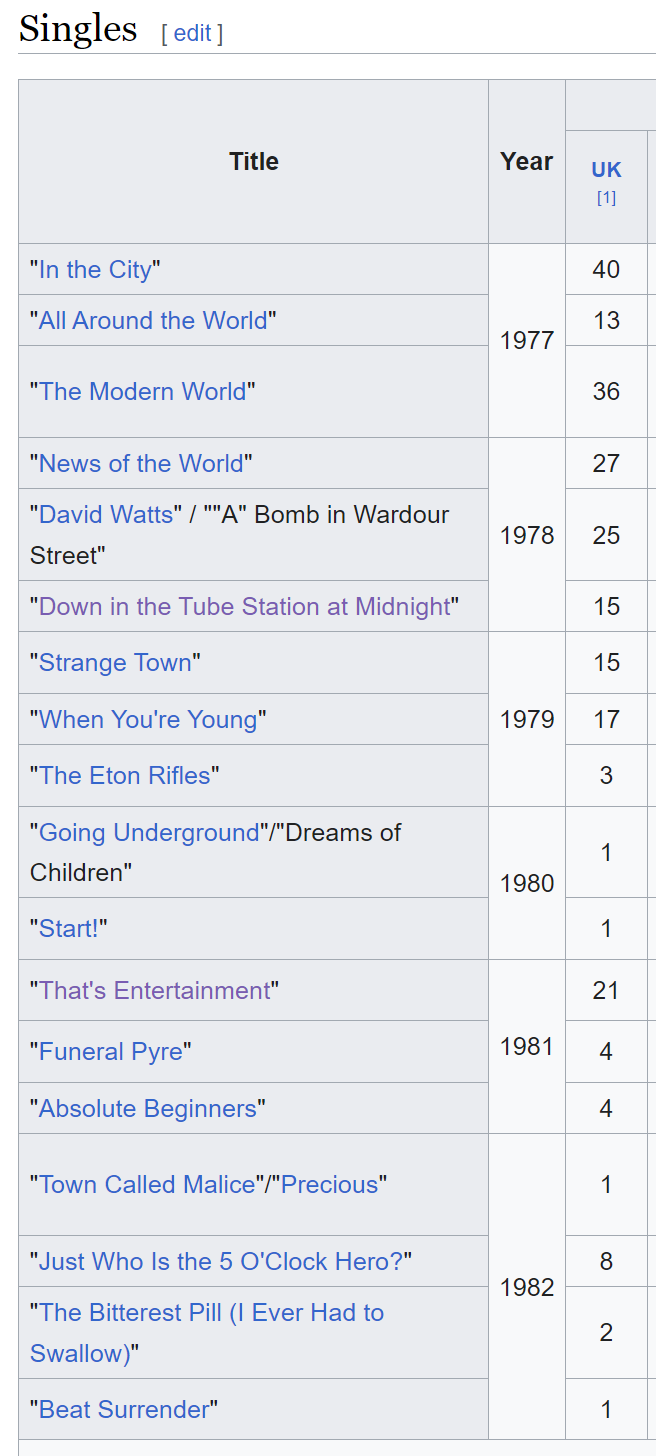Too many right-wing meetings
The Jam - 'Down In A Tube Station At Midnight' (All Mod Cons - 1978)
The BBC decided it wouldn’t play The Jam’s second single from their forthcoming third album, All Mod Cons. This didn’t prevent it from charting at #15 in Oct 1978, and from that point onwards, the band had a Midas touch with the UK Singles chart. Over the next four years, they would release a further 11 singles. Those next singles all made the top 20, nine in the top 10, including two #4s, a #3, a #2, and four chart-toppers. Three of those went in straight at number one when it was virtually1 unheard of. They even almost managed a top 20 with an import release of ‘That’s Entertainment’.
In 1978, The BBC were not keen to play a single that explored the danger and decay of the late 1970s. Radio One DJ Tony Blackburn was even minded to say in reaction to the song;
It’s disgusting the way punks sing about violence. Why can’t they sing about trees and flowers?
Honestly, that is what you would expect to hear from someone who launched Radio One by playing The Move’s ‘Blackberry Way’ eleven years earlier. Another of the song’s early non-fans included The Jam’s lead singer and songwriter, Paul Weller. He’d wanted to leave it off the album, but the producer, Vic Coppersmith-Heaven2, helped Weller knock the piece from a long poem into a song3, and bassist Bruce Foxton has recalled that Weller “actually discarded the song and threw it in the bin at the studio."
Coppersmith-Heaven himself told Sound on Sound magazine;
I remember Paul throwing certain songs out of the All Mod Cons album, like ‘Down in the Tube Station’, which he rejected largely because the arrangement hadn’t developed during the recording session. I said, ‘Hang on, I haven’t even read the lyrics yet, Paul… You should really work on this song, it’s great.
So what were Blackburn and the BBC worried about? The song contrasts suburban domestic warmth and contentment with random late-night violence in the city. It is one of those storytelling songs where the lyrics and the music4 position the listener in the song. Down in a tube station at midnight.
1970s London was one of decay, decline and division. It was dysfunctional and depopulating. In this atmosphere, the likes of The Clash and The Sex Pistols rose to prominence, but by 1978, both bands were looking to America - one for inspiration and the other, ultimately, imploding. They left behind in the UK a punk scene that certain other subcultures were trying to take advantage of.
During the 1970s, the activist left and far right gained prominence as the political centre appeared increasingly fragile due to minority governments and economic challenges. While there was undoubtedly violence bordering on riots at punk gigs, it was only the latest in a line of disorder that ran through escalating tensions due to football hooliganism, IRA bombings, the major miners' strike in 1972, the Notting Hill Riot of 1976, and the Battle of Lewisham in 1977. No wonder they aren’t singing about flowers and trees, as the threat of violence has been hanging over them for most of the decade.
In response to the growing popularity of left-wing ideologies among young people in the 1960s and early 1970s and more mainstream movements like 1976’s Rock Against Racism, the Young National Front was established in 1978. The far right targeted disenchanted working-class youth, attributing their problems to left-wing individuals and immigrants. This struggle between opposing ideologies attempting to connect with youth cultures and popular music is played out in ‘Down In A Tube Station At Midnight’ as a man is attacked by a right-wing gang with more than the smell of the National Front on them.
Throughout the song, we have the menace of the bass guitar in the left channel. Is it a syncopated beat that mimics an onrushing tube carriage, or is it our narrator’s heartbeat rising with the tension? The lyrics I consider among Weller’s finest efforts of this period. We get a vivid description of the near-deserted Underground environment, foreshadowing the narrator’s fate as he contemplates the violent nature of the headlines of the newspapers that billow around him.
In the section about buying a ticket, avowed anti-royalist Weller sings of fumbling for change and pulling out the Queen. This does sound like a man putting his hand in his pockets for coins to buy a ticket. It can be considered an idea that a generation’s ache for change could only go as far as “pulling out the Queen”.
The song doesn’t make it obvious, and some 45 years later, the reference to a man taking a curry home to his wife doesn’t immediately suggest that the man in question is South Asian. Still, given what we know about Weller and the band, it seems clear there is a racial motivation as this man is being beaten up and mugged by drunk, right-wing skinheads, and the Asian man is now down at the tube station at midnight. Lying on the platform, fading out of consciousness and staring up at British Rail adverts and worrying that not only the takeaway curry will be cold and the wine flat but, having taken his keys5, his wife might be surprised by the jack-booted thugs in their own home.
All the while, the guitar squalls and squeaks along with the bass ratcheting up along with the urgency of the vocal until we cut to London Underground sound effects6 and a final thirty-second instrumental reprise and then silence.
Of the 452 number ones since the first, which obviously went straight to number one, it had happened eight other times.
Coppersmith-Heaven also has credits on other Jam albums, Black Sabbath IV and an “interesting” album by Peter Wyngarde.
The Jam: The Making of All Mod Cons (2006).
As well as some sound effects recorded at St John’s Wood underground station.
We don’t get clarity on how they know where the house is. Do they know him? Are they local?






Great reminder, Mitchell, of one of my fave bands of that UK "punk" era...although, I really only followed them thru '79. I had no idea of their run of singles, at least in the UK. I suspect Polydor grew weary, in the US, of continuing to try to squeeze hit singles out of them at the dawn of the '80s.
Having just checked on their beginnings (a few years before the punk dawn), they're one of the acts that it's too bad they got lumped (and thus, discarded by too many) into that lazy genre tag. Joe Jackson comes to mind as another one. If artists like The Jam and Jackson could've been allowed to flourish outside of a genre "wave," it would've been fascinating to see their growth! But, good on Paul Weller for keepin' on keepin' on!
DITTSAM is my favourite Jam song and Wellers finest hour in a long career full of great moments. The tension and release between verse and brief chorus, the descriptive lyrics, building to the rushing climax - the use of the tube train sound on the album version only adds to the sense of danger - as the narrators life flashes before his eyes.... genius. An excellent write up on this song, a pleasure to read.